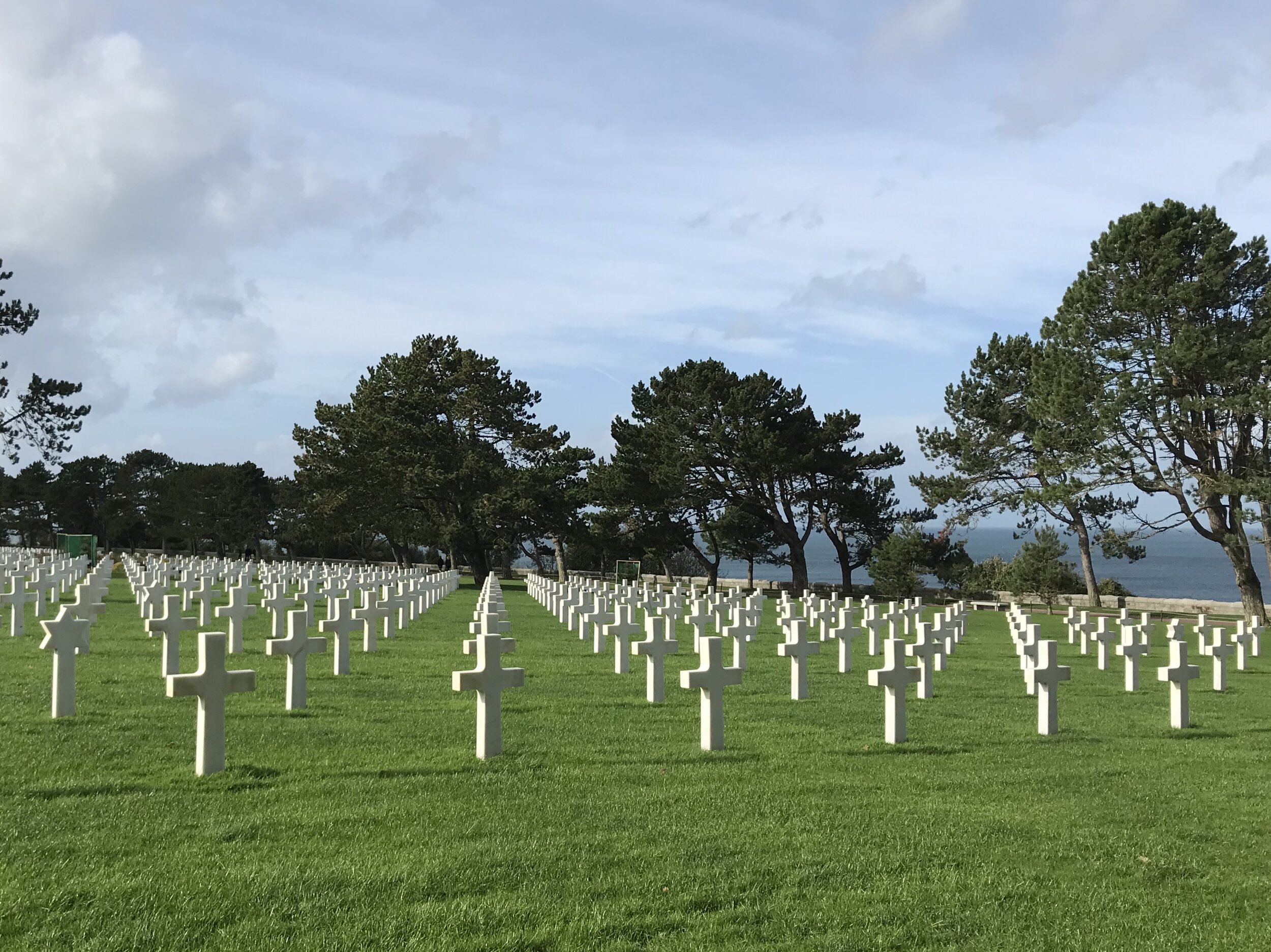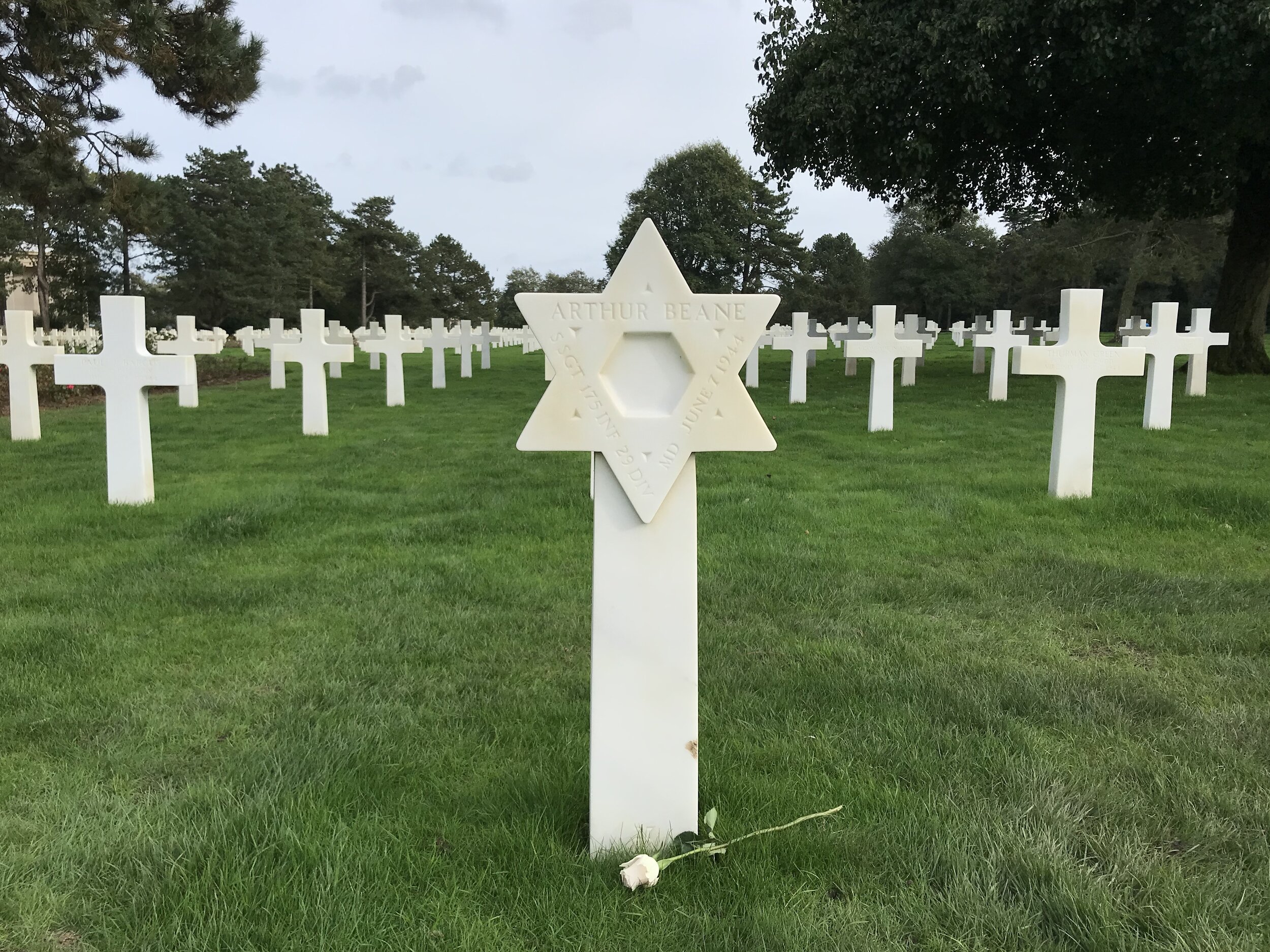What If The Allies Hadn’t Come? Reflecting On D-Day From The Beaches Of Normandy
Omaha Beach, Normandy
I saw the ocean before I saw the beach. And as we rolled into the parking lot, a sudden hush fell over the car. The five of us had been looking forward to this experience for months. And the trip from Paris had been filled with excited chatter. But as we closed in on our destination, the profoundness was beyond words.
Normandy.
So picturesque, I felt as though it leapt out of a children’s storybook. And yet so historic, it was the subject of world-renowned novels.
The small mound dividing the parking lot from the sand was just high enough for the beach grass to meet the sky, creating a pastel painting in motion. Threads of sunlight broke up an otherwise overcast day, and as I stepped out of the car, I was struck by a sense of peace.
The place commanded respect.
We were at Omaha beach. The largest and most renowned of the five D-Day beaches. It was the 75th anniversary of what was, at the time, the largest seaborne invasion in history. And world leaders had recently gathered to pay their respects to over 150,000 brave souls, who’d landed along a 50 mile stretch, to fight for our freedoms.
We made our way to the mound like baseball players ready to pitch. And as I came to the top, I paused to take in the view.
The beach seemed to go on forever.
And the magnitude of what had happened here suddenly hit me.
An elderly gentleman stood before us. I couldn’t see his face but his body language said it all. He slowly slumped forward as one does when in pain. And I could tell he was when he pulled a handkerchief from his pocket, and dabbed his eyes with a slow, shaky hand.
He was a veteran.
I felt a lump in my throat and a heaviness in my heart. I took a deep breath, and tried to swallow, as I subtly wiped away tears of my own from under my sunglasses. It was hard to imagine what this man was experiencing.
A familiar place scarred with his darkest memories.
There were two kids playing nearby. The younger one was chasing the other as they laughed, windswept hair, without a care in the world. And as the man watched them, he composed himself, and said, “this is what I fought for.”
Silent tears gently rolled down his cheeks.
It took every ounce of self-restraint to refrain from sobbing. For the elderly gentleman, his fellow soldiers, and the many, many victims of the atrocity they’d endured.
I wandered the beach in silence, trying to process the new dimension I’d entered setting foot on such historic ground. I’d read plenty of literature, watched tons of movies, but nothing compared to this.
Looking back, school flooded me with information, and prompted me to recall dates and locations to understand World War II. But standing on the beaches of Normandy, I was hit with waves of emotion as grand as the ocean before me.
For the first time, I wondered… What if the Allies hadn’t come? Or what if their plan had failed? Weather conditions had nearly derailed the entire operation. What if they had missed their window?
I thought about my childhood in Canada.
I’d taken it for granted. How peaceful it was. How much freedom I’d had.
And as I stared across the English Channel, to where the Allies had emerged from the fog, I pondered how different my life would be, had they not succeeded in their mission.
How different I would be.
I thought of my favourite book, All The Light We Cannot See, by Anthony Doerr. A story that connects a young blind girl forced to flee Nazi-occupied Paris, with a German orphan forced into the academy for Hitler Youth. What follows is an inspiring account of how intuition serves as a guiding light through valleys of darkness.
Eventually, I made my way back to the parking lot. A tour guide stood by a picnic table packed with tourists, talking a mile a minute, as he alternated between sipping an espresso and smoking a cigarette. His bright red rain coat, wide eyes, and animated hand gestures were a far cry from the subtleties I’d grown accustomed to in Paris. And I wondered if he was naturally demonstrative, or whether the profoundness of this place ignited something in him, as it did me.
He told a story of how he’d encountered a middle-aged Canadian man on a quest to retrace his fathers footsteps. The man had uncovered a journal shortly after his father’s passing. And with it came a time capsule transporting him through the latter half of 1944.
The next day, we drove to the D-Day cemeteries.
The tour guide had joked with my American friend that she could return to the US within minutes, since America maintained ownership of the land encompassing their cemetery. Walking through it felt as though we were in a film like Pearl Harbour. Peaceful and powerful, the land overlooked the Atlantic, with endless rows of large white crosses, and the Star of David facing home.
The Canadian cemetery was much smaller, and each headstone was engraved with a heartfelt quote. Some had framed photos of men in uniform nestled in the flower beds before them.
Thinking about how these men ended up here, took me right back to Omaha beach. I thought about the older gentleman, and the years robbed of the young men in the photos staring back at me.
How brave they’d had to have been to end up here.
I’d planned this trip to Normandy because I was compelled to see where Canadian and French history intersected on such a profound level. But I realized in that moment, I wouldn’t have had the chance to live in Paris had it not been for D-Day paving the city’s way to freedom from Nazi rule.
After all, D-Day was the turning point in the war. The beginning of the end.
And though I’d always known that, my experience in Normandy evoked more thoughts and feelings in me than I’d expected.
So, I invite you to pause and reflect on your connection to that fateful day. And how different your life would be had the Allies not come.
How different you would be.
Thank you for reading my article. Please connect with me on Twitter or LinkedIn for similar content.
P.S. Below are some photos from the D-Day sites mentioned above.
A historical site believed to be one of the first houses on French soil — if not the first — liberated by the Allied Forces.
The American Cemetery. A touching tribute with endless rows of crosses and the Star of David facing “home” to the US.
The Canadian Cemetery. A touching memorial with each headstone engraved with a Canadian maple leaf.
The American Cemetery.
The Canadian Cemetery.
One of the most famous shots encapsulating D-Day. If you look closely, you can see some soldiers arrived with bikes to get inland faster.







